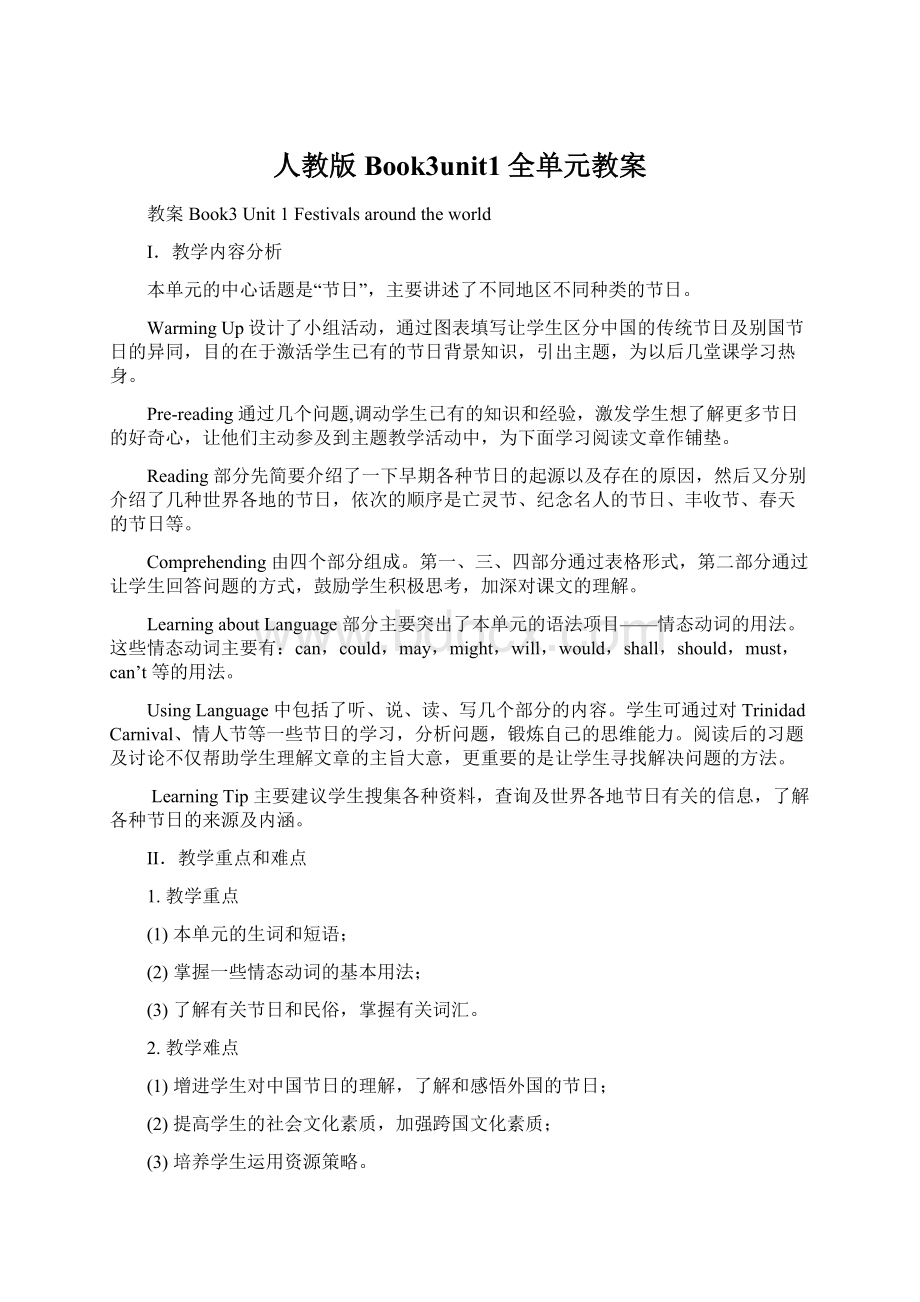人教版Book3unit1全单元教案.docx
《人教版Book3unit1全单元教案.docx》由会员分享,可在线阅读,更多相关《人教版Book3unit1全单元教案.docx(12页珍藏版)》请在冰豆网上搜索。

人教版Book3unit1全单元教案
教案Book3Unit1Festivalsaroundtheworld
I.教学内容分析
本单元的中心话题是“节日”,主要讲述了不同地区不同种类的节日。
WarmingUp设计了小组活动,通过图表填写让学生区分中国的传统节日及别国节日的异同,目的在于激活学生已有的节日背景知识,引出主题,为以后几堂课学习热身。
Pre-reading通过几个问题,调动学生已有的知识和经验,激发学生想了解更多节日的好奇心,让他们主动参及到主题教学活动中,为下面学习阅读文章作铺垫。
Reading部分先简要介绍了一下早期各种节日的起源以及存在的原因,然后又分别介绍了几种世界各地的节日,依次的顺序是亡灵节、纪念名人的节日、丰收节、春天的节日等。
Comprehending由四个部分组成。
第一、三、四部分通过表格形式,第二部分通过让学生回答问题的方式,鼓励学生积极思考,加深对课文的理解。
LearningaboutLanguage部分主要突出了本单元的语法项目——情态动词的用法。
这些情态动词主要有:
can,could,may,might,will,would,shall,should,must,can’t等的用法。
UsingLanguage中包括了听、说、读、写几个部分的内容。
学生可通过对TrinidadCarnival、情人节等一些节日的学习,分析问题,锻炼自己的思维能力。
阅读后的习题及讨论不仅帮助学生理解文章的主旨大意,更重要的是让学生寻找解决问题的方法。
LearningTip主要建议学生搜集各种资料,查询及世界各地节日有关的信息,了解各种节日的来源及内涵。
II.教学重点和难点
1.教学重点
(1)本单元的生词和短语;
(2)掌握一些情态动词的基本用法;
(3)了解有关节日和民俗,掌握有关词汇。
2.教学难点
(1)增进学生对中国节日的理解,了解和感悟外国的节日;
(2)提高学生的社会文化素质,加强跨国文化素质;
(3)培养学生运用资源策略。
本单元分五课时:
第一课时:
Warmingup,Pre-reading,Reading&Comprehending
第二课时:
LearningaboutLanguage
第三课时:
Listening(UsingLanguage)Speaking(UsingLanguage),Listening(Workbook)&Listeningtask(Workbook)
第四课时:
Reading(UsingLanguage)&Readingtask(Workbook)
第五课时:
Speakingtask(Workbook),Writing(UsingLanguage)&SummingUp
IV.教学步骤:
Book3Unit1第一课时
Warmingup,Pre-reading,Reading&Comprehending
TeachingGoals:
1.ToarouseSs’interestinlearningaboutthefestivalsaroundtheworld.
2.ToimproveSs’listeningability.
3.TotrainSs’speakingability.
TeachingProcedures:
Step1.Leading-in
Purpose:
ToactivateSsandarousethemtoexpresstheiropinionsaboutafestival.
LeadSstothecontentofthisunit.
Step2.WarmingUp
1.AskSstoturntoP1andworkingroupstocompletetheformonP1.
2.AskSstodiscussfestivalstheyhavefilledintheformandtheirimportancetothesociety.Afterthat,askSstopresenttheiropinionstoallclassmates.
Step3.Pre-listening
Purpose:
TohelpSslearnaboutthecontextoftheListeningtext.
AskSstotalkaboutthefollowingquestionstogetthempreparedtolistentothereadingtext.
1.Howmanyancientfestivalsdoyouknow?
2.AreforeignfestivalsdifferentfromChinesefestivals?
Inwhatpart?
Step4.Listening
Purpose:
Togetthemaininformationinthelisteningpart.
TodevelopSs’listeningability
Tolearnsomeinformationaboutthefestivalsaroundtheworld.
AskSstolistentothetape,focusonthesubjectsmentionedinthepassageandthenanswerthefollowingquestion.
1.Howmanykindsoffestivalswerementionedinthetext?
SuggestedAnswer:
Five.
2.Whatarethey?
SuggestedAnswer:
AncientFestivals
FestivalsoftheDead
FestivalstoHonorPeople
HarvestFestivals
SpringFestivals
Step5.Pre-reading
DivideSsintogroupsoffourandaskthemtodiscussthefollowingquestions.
1.What’syourfavoriteholidayoftheyear?
Why?
2.Whatfestivalsorcelebrationsdoyouenjoyinyourcityortown?
Doyoulikespendingfestivalswithyourfamilyorwithfriends?
Whatpartofafestivaldoyoulikebest---themusic,thethingstosee,thevisitsorthefood?
Step6.Fastreading
AskSstoreadthetextquicklyandanswerthefollowingquestions.
1.Whatarefestivalsofthedeadusuallyfor?
2.Whatmakeautumnfestivalshappyevents?
3.Whatdopeopleusuallydoatspringfestivals?
4.Whatisoneimportantreasontohavefestivalsandcelebrations?
5.ComparethefestivalsofthedeadinMexico,JapanandChina.Whatthingsaresimilar?
Whatthingsaredifferent?
Answers:
1.Festivalsofthedeadareforhonoringorsatisfyingdeadancestorsorothers,whosomepeoplebelievemightreturnto
helporharmlivingpeople.
2.Autumnfestivalsarehappyeventsbecausepeoplearethankfulthatfoodisreadyforwinterandthehardfarmworkis
finished.
3.Atspringfestivals,peopleusuallyhavedances,carnivalsandotheractivitiestocelebratetheendofwinterandthe
comingofspring.
4.Itisimportanttohavefestivalsandcelebrationssowecanenjoylife/beproudofourcustoms/forgetourworkfora
littlewhile.
5.TheChinese,JapaneseandMexicanfestivalsofthedeadallhavecustomstohonourthedead.TheChineseand
Japanesegotocleantheirancestors’graves,andtheMexicanofferfood,flowersandgiftstothedead.However,thereare
somedifferences.TheMexicanseatspecialfoodthatlookslikebones,somethingtheChineseandJapanesedonotdo.
Step7.Intensivereading
1.AskSstoreadthetextcarefullyandsumupthemainideaofeachpart.
2.Discussinpairswhichfestivalsyouthinkarethemostimportantandwhicharethemostfun.Thenfillinthechartwithyourideas.
Typeoffestival
Exampleoffestival
Reasonsforyourchoice
Mostimportant
Mostfun
Answer:
3.AskSsthefollowingquestionandencourageSstogivesomesimilaritiesthattheythinkfestivalshave,andgivetheirreasons.TheninvitesSstotellthesimilaritiesandthenaskthemtopresentthembeforetheclass.
Whatsimilaritiescanyoufindamongthesefestivals?
SuggestedAnswer:
Theymostincludefood,musicorentertainment,likedances,lightorfire.
Theyaremosttogetherwithfamilyandfriends.
Festivalsexisteverywhere.
Manyofthemcelebratesimilarideasandimportantculturaleventsorremembereventofpeople.
Humanbeingsneedtohavethingsinlifetocelebrateandhaveabreakfromdailystrugglesanddemands.
Step8.Homework
Purpose:
Togetafurtherunderstandingofthetext.
1.AskSstocontinuediscussingtheiropinionsaboutfestivalswiththeirpartners.
2.AskSstoreadthetextonceagainandtrytoretellthetext.
3.AskSstodiscoverusefulwordsandexpressionsinthetext.
Book3Unit1第二课时
LearningaboutLanguage
TeachingGoals:
1.Tocheckwhathasbeenlearnedyesterday.
2.ToenableSstomastersomenewwordsandexpressions.
3.TogetSstohaveknowledgeofthegrammarpoint:
themodelverb
TeachingProcedures:
Step1.Revision
1.AskSomeSstoretellthereadingtext.
2.AskSstoanswerthefollowingquestiontoseewhethertheydidtheirhomeworkornot.
Howmanyfestivalsarementionedinourtext?
Step2.Wordstudy
Purpose:
Toconsolidatethewordsandphrasesinthetext.
FinishEx1
Purpose:
ToenableSstomastersomenewwordsandexpressions.
Ex2ManypeoplethinkthatChristmasisawestern__________,butinfactitisreallyaworldwideholiday.Christmasactuallyasa_______festivalcelebratedby_________aroundtheworld.Its______isaroundthe3rdor4thcenturyAD,whenthe_______ofrememberingJesus’birthonDecember25thfirststarted.Today,ofcourse,manypeoplecelebrateChristmas__________itwerejustaholidayto______________family,ratherthanaholidayabouta_______.
Answers:
celebration,religious,Christians,origin,custom,asthough,haveafunwith,belief
Step3.Grammarpoint
1.ExplainforSsthegrammarpoint:
themodalverb
(1)can/could可以表示能力、许诺、请求或某种可能性,could还可用于:
①提出委婉的请求,(注意在回答中不可用could)。
例如:
—CouldIhavethetelevisionon?
我能看电视吗?
—Yes,youcan./No,youcan't.可以/不可以。
②在否定句、疑问句中表示推测或怀疑。
例如:
Hecouldn'tbeabadman.他不大可能是坏人
(2)may/might表示允许或请求;表示没有把握的推测;may放在句首,表示祝愿。
might表示推测时,不表示时态,只是可能性比may小。
(3)will/would克表示请求、许诺、同意、过去的习惯等。
但需要注意:
①wouldlike;wouldliketodo=wantto想要,为固定搭配。
例如:
Wouldyouliketogowithme?
想和我一块去吗?
②Willyou…?
Wouldyoulike…?
表示肯定含义的请求劝说时,疑问句中一般用some,而不是any。
例如:
Wouldyoulikesomecake?
吃点蛋糕吧。
③否定结构中用will,一般不用would,won'tyou是一种委婉语气。
Won'tyousitdown?
你不坐下吗?
(4)shall/should可以表示推测、判断或建议。
shall指现在,should指过去。
(5)must/can’t指推测或猜想must用在肯定句中表示较有把握的推测,意为“一定”,否定推测用can't。
2.AskSstofindatleastfoursentenceswhichusemodalverbsinthereadingtextandtranslatethemintoChinese.Seewhocanmakethebesttranslation.
Answers:
(1)…whentheycandressupandgototheirneighbors’homesandaskforsweets.(line9,part2)
那时他们可以化装并去邻居家要糖果。
(2)Somepeoplemightwinawardsfortheir,…(line4,part4)一些人可能会因他们的……而获奖。
(3)…andmaygivechildrenluckymoneyinredpaper.(line3,part5)也可能给孩子们用红包包起来的压岁钱。
3.AskSstofinishEx3onP6andchecktheanswersinpairs.
Step4.Homework
1.AskSstoreviewwhathasbeenlearnedinthisperiod.
2.AskSstofinishtheexercisesofUsingWordsAndExpressionsandUsingStructuresonP42~P43.
Book3Unit1第三课时
Listening(UsingLanguage)Speaking(UsingLanguage),Listening(Workbook)&Listeningtask(Workbook)
TeachingGoals:
1.TodevelopSs’listeningability.
2.Tolearnmoreinformationaboutfestivals.
TeachingProcedures:
Step1.Listening(UsingLanguage)
1.AskSstodiscussthequestionswiththeirpartnersingroupsoffourandtrytogivetheanswers.
(1)WhatisaCarnival?
(2)WhatdotheyusuallydointheCarnivalParade?
2.AskSstolistentothetapeandtrytogetthemainideaofthelisteningtext.
3.AskSstolistentothetapeagainandanswerthefollowingquestions.
(1)WhatiswrongwithLiMei’sclothingandshoes?
(2)WhatadvicedoesCarlagiveLiMei?
(3)Whyisitimportantforthemtohavewater?
(4)Whyisitdifficultforthemtoheareachother?
(5)Whydotheyplantomeetattheparkinglotat8o’clock?
Answers:
1)LiMei’sclothingistoothickandhershoesarenotcomfortableenoughtowalkinforalongtime.
2)CarlasuggeststhatLiMeichangeherclothestosomethingcomfortable,wearsomelighterandcoolerclothingandalsotakeahat.
3)Itisimportantforthemtohavewaterbecauseitisveryhotandtheywillbedoingalotofwalking.
4)Itisdifficultforthemtoheareachotherbecausethemusicisveryloud.
5)Theyplantomeetattheparkinglotat8o’clockbecausetheymightgetseparatedincrowed.
4.PlaythetapeagainforSstochecktheiranswers.
Step2.Speaking(UsingLanguage)
Imagin